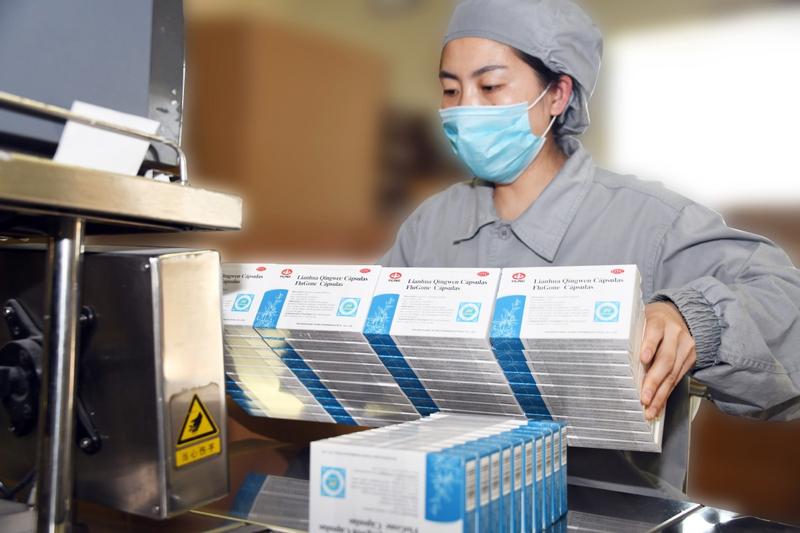 A worker sorts products at Shijiazhuang Yiling Pharmaceutical Co, which produces the Chinese medicine lianhua qingwen. (PHOTO PROVIDED TO CHINA DAILY)
A worker sorts products at Shijiazhuang Yiling Pharmaceutical Co, which produces the Chinese medicine lianhua qingwen. (PHOTO PROVIDED TO CHINA DAILY)
Authorities are speeding up efforts to develop new drugs based on traditional Chinese medicine prescriptions that have proved effective in treating COVID-19 to boost the fight against the pandemic, China's top TCM authority said.
Meanwhile, scientific and evidence-based research will be given more emphasis in the development of TCM, which had traditionally been based on practical experience, to promote its recognition across the world, the National Administration of Traditional Chinese Medicine said last month.
To accelerate the availability of new COVID-19 drugs, TCM researchers have intensified efforts, including analyzing data collected during the use of TCM prescriptions in treating COVID-19 patients across China, the administration said.
Meanwhile, it has been working with the National Medical Products Administration, the top drug authority, to streamline approval procedures for TCM drugs based on existing prescriptions. A special evaluation committee comprising top academicians and TCM practitioners will be set up, the TCM administration said.
Some TCM prescriptions developed as part of the emergency response right after the start of the epidemic in China have been extensively used, with promising efficacy recorded.
ALSO READ: Honoring TCM's role in COVID-19 fight
Qingfei Paidu Tang, one of the prescriptions, which is based on a number of treatments mentioned in a classical TCM work dating back to the Han Dynasty (206 BC-AD 220), has been used in 28 provincial-level regions since February after trials proved it can effectively improve the conditions of COVID-19 patients.
Many other TCM drugs and prescriptions have also been used together with modern medicine over the past year to treat COVID-19 patients. More than 92 percent of confirmed COVID-19 patients in China had used TCM, according to a white paper released by the central government in June, and more than 90 percent of patients who received TCM treatment in Hubei province, the hardest-hit area in China, saw their conditions improve.
To help fight the COVID-19 pandemic, the TCM administration has increased exchanges with other countries and regions and provided assistance such as sending medical teams to guide treatment and providing TCM drugs at their request.
With increasing demand for TCM around the world, the administration will intensify efforts to promote its internationalization, including emphasizing the role of scientific research in the development of TCM, the administration said.
Evidence-based medicine can help further elaborate the scientific nature and effectiveness of TCM, so international society can have a better understanding and recognition of TCM.
China's National Administration of Traditional Chinese Medicine
"Evidence-based medicine can help further elaborate the scientific nature and effectiveness of TCM, so international society can have a better understanding and recognition of TCM," it said.
The administration will encourage domestic institutions to intensify research using the latest technology and improve cooperation with leading institutes overseas to achieve breakthroughs, the administration said.
Song Ruilin, president of the China Pharmaceutical Innovation and Research Development Association, said although TCM is based on practical experience, it also needs sufficient scientific evidence to prove its efficacy, as is the case with modern medicine. Without adequate data from clinical trials, it will be difficult for TCM to be widely recognized across the world, he said.
"The classic TCM theories must be integrated with the evaluation methods of modern medicine to promote the healthy development of TCM and its internationalization," he said.
READ MORE: TCM readily winning acceptance overseas
Traditional courses for clinical students
Traditional Chinese medicine courses will become mandatory for undergraduate students majoring in clinical medicine, according to a guideline released by central government departments to promote high-quality TCM education.
Meanwhile, about 100 top-level majors for TCM undergraduate students will be established in medical colleges across China as part of efforts to strengthen the TCM discipline, said the guideline, jointly released last month by the Ministry of Education, National Health Commission and National Administration of Traditional Chinese Medicine.
Reform will also take place in the TCM curriculum, including streamlining TCM courses and teaching plans, and it is expected that in about five years undergraduate students majoring in TCM will start studying TCM courses first, instead of modern medicine, after entering college.
Medical colleges will also increase the share of TCM classics courses in their TCM courses, and courses on TCM treatments for infectious diseases should be set up, the guideline said.
TCM departments in colleges should also establish a system that improves tutorship and encourages students to start internships earlier. Efforts will be made to encourage senior TCM experts and practitioners to participate in the teaching, tutoring and training of college students majoring in TCM.
To produce high-level talent that excels in both TCM and modern medicine, pilot programs will be carried out in some medical colleges to provide nine-year medical education to students, the guideline said.
In addition to colleges, vocational schools should also reform TCM education and training, it said. Measures will be taken to support TCM vocational schools' provision of training in TCM healthcare services to both students and people outside schools to meet the increasing demand for such services.
Contact the writer at wangxiaodong@chinadaily.com.cn


